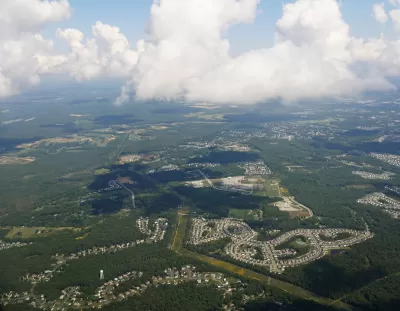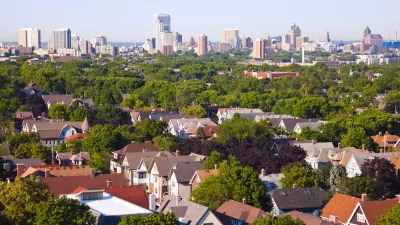The county’s zoning reform plan would have promoted ‘missing middle housing’ types of up to six units on lots previously zoned for single-family housing.

Arlington County, Virginia will be barred from enacting its ‘missing middle’ zoning reform plan after a state trial court ruled against it. The plan would have allowed property owners to build up to six units on single-family zoned lots.
According to a Reason commentary by Ilya Somin, a land use scholar and Arlington County resident, “The new policy could do much to protect property rights, reduce housing costs, and make it possible for more people to move to Arlington and make use of the many job and education opportunities available in the area, thereby benefiting both themselves and the regional economy.”
However, as a summary of the ruling notes, “Judge David Schell ruled against the county on four counts this morning (Friday), finding that the county failed to adequately consider localized impacts, failed to follow proper procedure and violated state tree canopy requirements when adopting the amendments.” The county is prohibited from issuing any additional permits under the law.
For Somin, the ruling brings into focus the need for statewide zoning reform and stronger property rights protections that would prevent zoning reform from being blocked, such as in this case. “A statewide law could abrogate or at least limit the kinds of procedural hurdles relied on by the plaintiffs here. A state constitutional amendment would be even better.”
FULL STORY: Virginia Court Rules Against Arlington "Missing Middle" Zoning Reform

Study: Maui’s Plan to Convert Vacation Rentals to Long-Term Housing Could Cause Nearly $1 Billion Economic Loss
The plan would reduce visitor accommodation by 25,% resulting in 1,900 jobs lost.

North Texas Transit Leaders Tout Benefits of TOD for Growing Region
At a summit focused on transit-oriented development, policymakers discussed how North Texas’ expanded light rail system can serve as a tool for economic growth.

Using Old Oil and Gas Wells for Green Energy Storage
Penn State researchers have found that repurposing abandoned oil and gas wells for geothermal-assisted compressed-air energy storage can boost efficiency, reduce environmental risks, and support clean energy and job transitions.

Private Donations Propel Early Restoration of Palisades Playground
Los Angeles has secured over $1.3 million in private funding to restore the Pacific Palisades playground months ahead of schedule, creating a modern, accessible space that supports community healing after recent wildfires.

From Blight to Benefit: Early Results From California’s Equitable Cleanup Program
The Equitable Community Revitalization Grant (ECRG) program is reshaping brownfield redevelopment by prioritizing projects in low-income and environmental justice communities, emphasizing equity, transparency, and community benefits.

Planting Relief: Tackling Las Vegas Heat One Tree at a Time
Nevada Plants, a Las Vegas-based nonprofit, is combating the city’s extreme urban heat by giving away trees to residents in underserved neighborhoods, promoting shade, sustainability, and community health.
Urban Design for Planners 1: Software Tools
This six-course series explores essential urban design concepts using open source software and equips planners with the tools they need to participate fully in the urban design process.
Planning for Universal Design
Learn the tools for implementing Universal Design in planning regulations.
Ascent Environmental
Borough of Carlisle
Institute for Housing and Urban Development Studies (IHS)
City of Grandview
Harvard GSD Executive Education
Toledo-Lucas County Plan Commissions
Salt Lake City
NYU Wagner Graduate School of Public Service





























